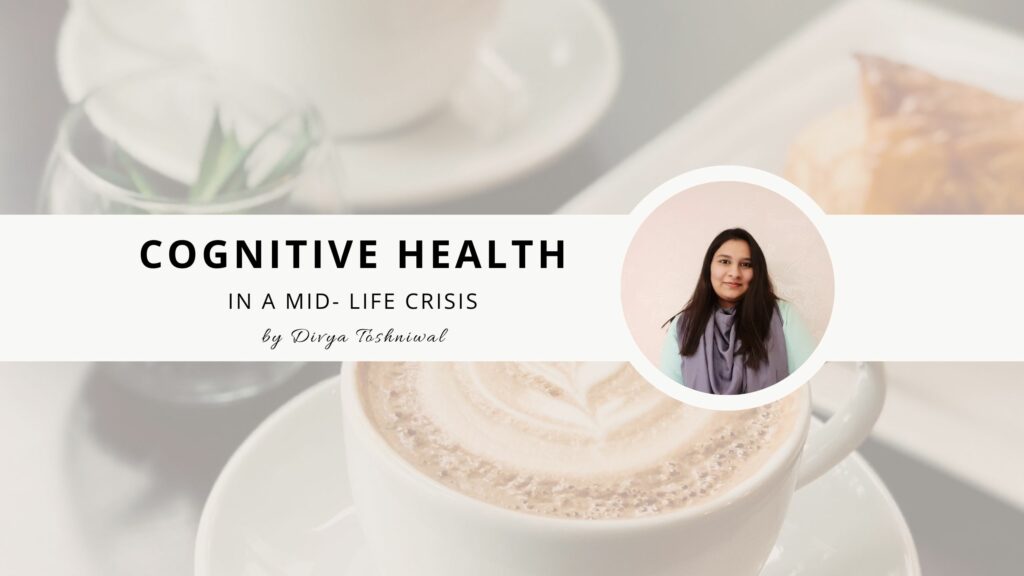The mid-life crisis comes into the picture of an adult around the age of 40 to 55. This is a stressful time in an adult’s life when they shift to a new zone in their professional and personal lives. Their sense and dimension of responsibilities change from what they used to be at a young age. A person also starts to think about the limited number of years they have and what they want to accomplish in them. They start doubting the meaning of their life and their desire to leave an impact and live fruitful life increases. Along with all the emotional turmoil that a person is going through in this phase of life, there is also a significant impact on their cognitive health. Focusing on your cognitive health in a mid-life crisis can be a life-changing step you take. But before we start with how to maintain your cognitive health in a mid-life crisis let us understand what a mid-life crisis is.
What is the Mid-Life Crisis?
Have you ever asked yourself ‘ WHO AM I? ‘ or ‘WHERE AM I GOING? ‘ or sometimes it may be ‘ WHAT THE HELL AM I DOING WITH MY LIFE?’
A mid-life crisis can be defined as a time period of emotional turmoil and anxiety that is suffered particularly by people ages 40-55. This confusion and anxiety are created by the difference in where they are in life and what they want in life.
According to Erikson, in midlife, a person faces the crisis of generativity vs stagnation.
The mid-life crisis generally begins due to the unwelcome changes that aging brings about. It can be a realization of your own mortality, changes in your health conditions, panic over unrealized ambitions, changes in your appearance, your children becoming more self-dependent, changes in your financial stability, and so on.
Signs That You Are Going through a Mid-Life Crisis
- Decreased self-confidence
- Overly concerned about your appearance or what others think about you
- Sudden changes in mood and increasing irritability
- Reduced motivation levels and doubts regarding the goals you have set.
- Thoughts about your existence, the purpose of your life or death.
- Reduced energy levels and sexual desires.
- Boredom and /or frustration with your job, relationship, or life in general.
- Hypochondria and exaggerated health concerns.
- Overthinking about each and everything. [ Also read about the patterns of overthinking and how you can stop it ]
- Becoming irrational or anti-social.
Impact of Mid-Life Crisis on Cognitive Abilities:
The mid-life crisis has a huge psychological impact on an individual and along with that, there is also a decrement in the cognitive abilities to deal with. It is important that in such a stage of life, along with increased attentiveness towards one’s physical health, there also should be equal attention paid to one’s cognitive health.
Cognitive abilities that start decrementing along with age are mostly – memory, processing speed, organization, and orientation. With a reduction in the capacity to store and recall things the reduced memory capacity of individual impacts the overall productivity of the individual. As the ability to process data reduces the efficiency of the individual reduces too.
Various research has shown that cognitive abilities are high during mid-life. Research also shows that how you deal with this mid-life crisis and how you use your cognitive abilities during this time period sets the stage for your cognitive health in the coming years.
How to Maintain Cognitive Health in a Mid-Life Crisis?
The following things can help in maintaining cognitive health during a mid-life crisis:
1. Brain-training Games: It is important that we engage in mentally challenging activities regularly in order to keep our brains active and working. Solve puzzles, and crosswords or learn a new skill. Challenge your brain with something new. So, if you have been an accountant or a data analyst for 25 or 30 years then you should probably take an art class or an archery class. The basic message is to do something new and unrelated to what you have been doing as a profession. You will develop new synapses for everything new you learn.
2. Social Interaction: Research has shown that social interactions boost your cognitive abilities. Participation in social activities can have a significant impact on lowering the risk of cognitive decline. Building social networks and participating in social activities can be extremely effective for improving your cognitive function.
3. Physical Fitness: Physical workouts can help improve your cognitive function. It reduces anxiety and depression too. In older adults, higher muscle strength is associated with slower cognitive decline. Physical exercise helps to develop better memory, enhances mood, and also improves sleep.
4. Adaptability: The world is changing and it is changing quickly. It is obvious that many of us do not feel at par with the upcoming generation, technological advancement, and the changing thought process of people. Everything may seem so different than it was when you were growing up. You may feel left behind and that may add to your mid-life crisis. Being adaptable and open to new experiences will create new paths and will help you to be in touch with what really is going on in the world.
5. Good Sleep Hygiene: Sleep patterns can be disturbed during this phase of life, the reasons for which can be multiple. Having good sleep can be a life-changer to maintaining your cognitive health in a mid-life crisis. To do so it is important to build a sleep hygiene routine.
6. Healthy Diet: High consumption of fruits and vegetables have been linked to reduction in cognitive disorders. Plant based food are best to improve you cognitive function. Poor diet that are classified as junk food and aren’t enough nutritious are linked to demetia and other cognitive disorders in old age.
7. Stop Multi-tasking: Multi-tasking also impacts your cognition adversely. When you mullti-task, the capacity of your brain to perform decreases. Multi-tasking slows you down and also lowers your IQ. It was believed that this decline in cognition was temporary , but the new studies have shown otherwise. Multi-tasking can cause permanent damages.
8. Meditation: Meditation can improve a number of cognitive functions including attention, memory, decision making and executive functioning. Meditation help you focus on the current moment and thus reduces overthinking and its accompanying adverse mental health issues like depression and anxiety.
9. Learn to Manage Stress : Stress is inevitable , you cannot eliminate it from your life. So instead of trying to avoid any stressful situation learn how to manage stress. Here are few tried and tested ways to reduce stress.

